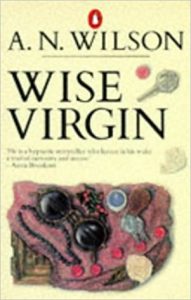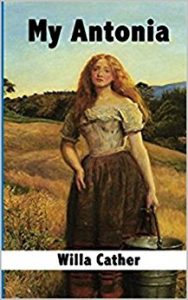EVAN S. CONNELL, A. N. WILSON, WILLA CATHER: NOVEL BEGINNINGS
 Thinking about how novels begin, I recently pulled many books off my shelves and was surprised by how unspectacular the beginnings of most seemed to me. There were exceptions, however. Consider:
Thinking about how novels begin, I recently pulled many books off my shelves and was surprised by how unspectacular the beginnings of most seemed to me. There were exceptions, however. Consider:
Her first name was India–she was never able to get used to it. It seemed to her that her parents must have been thinking of someone else when they named her. Or were they hoping for another sort of daughter? As a child she was often on the point of inquiring, but time passed, and she never did.
Thus begins Evan S. Connell’s Mrs. Bridge published in 1959. (One wonders if today’s editors would let the passive voice of the second sentence stand.)
 Or, for a distinctive beginning, consider A. N. Wilson’s Wise Virgin (1983):
Or, for a distinctive beginning, consider A. N. Wilson’s Wise Virgin (1983):
“Marry me,” said Louise Agar.
She stood behind Giles Fox’s chair, quivering with the novelty of the gesture, and cast her arms around his throat, so that, as he sat there, stonily upright, he could feel the thick folds of her hair hanging about his carefully shaven cheeks like a false beard.
Silence followed her exclamation, and they listened to her heart beats as she nuzzled against his long pale face. At length, quietly, he spoke.
“I don’t know if that is a request or a command.”
Willa Cather, one of my all-time favorite authors, begins her classic My Antonia (1918):
 Last summer I happened to crossing the plains of Iowa in a season of intense heat, and it was my good fortune to have for a traveling companion James Quayle Burden–Jim Burden as we still call him in the West. He and I are old friends–we grew up together in the same Nebraska town–and we had much to say to each other. While the train flashed through never-ending miles of ripe wheat, by country towns and bright-flowered pastures and oak groves wilting in the sun, we sat in the observation car, where the woodwork was hot to the touch and red dust lay deep over everything. The dust and heat, the burning wind, reminded us of many things. We were talking about what it is like to spend one’s childhood in little towns like these, buried in wheat and corn, under stimulating extremes of climate: burning summers when the world lies green and billowy beneath a brilliant sky, when one is fairly stifled in vegetation, in the color and smell of strong weeds and heavy harvests; blustery winters with little snow, when the whole country is striped bare and gray as sheet iron. We agreed that no one who had not grown up in a little prairie town could know anything about it. It was a kind of freemasonry, we said.
Last summer I happened to crossing the plains of Iowa in a season of intense heat, and it was my good fortune to have for a traveling companion James Quayle Burden–Jim Burden as we still call him in the West. He and I are old friends–we grew up together in the same Nebraska town–and we had much to say to each other. While the train flashed through never-ending miles of ripe wheat, by country towns and bright-flowered pastures and oak groves wilting in the sun, we sat in the observation car, where the woodwork was hot to the touch and red dust lay deep over everything. The dust and heat, the burning wind, reminded us of many things. We were talking about what it is like to spend one’s childhood in little towns like these, buried in wheat and corn, under stimulating extremes of climate: burning summers when the world lies green and billowy beneath a brilliant sky, when one is fairly stifled in vegetation, in the color and smell of strong weeds and heavy harvests; blustery winters with little snow, when the whole country is striped bare and gray as sheet iron. We agreed that no one who had not grown up in a little prairie town could know anything about it. It was a kind of freemasonry, we said.
Such an elegant beginning for a novel.
In the half hour I spent perusing beginnings, I was struck by the fact that the most noteworthy to me were from decades ago. Is this merely logical, since these are works of the quality that withstood the test of time, as perhaps some more recent and current works will? Somehow, recent beginnings don’t persuade me to believe something isn’t being lost.
In my perusal I found a handful more beginnings of special worth which I’ll share in future posts.
Gary Garth McCann
First-prize winner for short works and for suspense/mystery, Maryland Writers’ Association, Gary Garth McCann is the author of the novella Young and in Love? and of the novels The Shape of the Earth and The Man Who Asked To Be Killed, praised at the Washington Independent Review of Books. His most recent published stories are available online in Chelsea Station Magazine, Erotic Review Magazine, and in Mobius: The Journal of Social Change. His other stories appear in The Q Review, reprinted in Off the Rocks, in Best Gay Love Stories 2005, and in the Harrington Gay Men’s Fiction Quarterly. See his blogs at garygarthmccann.com and streamlinermemories.com.
- Web |
- More Posts(57)